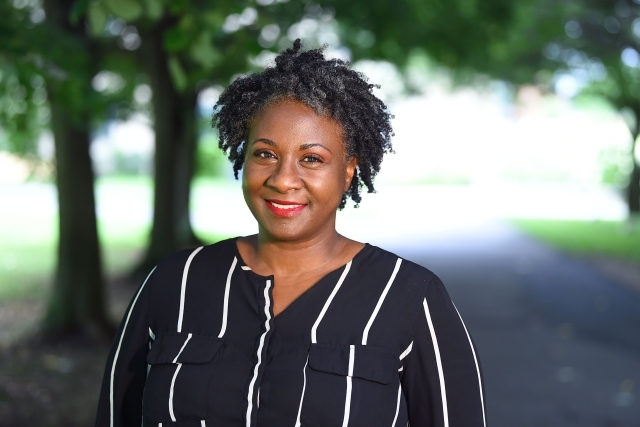
For her outstanding work in the arena of reducing racial and ethnic disparities in health care, the American Society of Health-System Pharmacists (ASHP) and the Association of Black Health System Pharmacists (ABHP) have presented their annual ASHP-ABHP Joint Leadership Award to Manouchkathe Cassagnol, Pharm.D., BCPS, BCCP, FACC, FAHA. Dr. Cassagnol, a Clinical Professor in the Department of Clinical Health Professions, serves as Assistant Dean for Community Engagement, Equity, and Belonging, in the College of Pharmacy and Health Sciences, and Executive Director for the Academic Center for Equity and Inclusion.
“The award acknowledges pharmacists who specifically do this kind of work. It’s quite an honor to be recognized in this way,” Dr. Cassagnol noted. She served as Program Coordinator of the Changing Faces of Pharmacy: Student Enrichment Program, an educational outreach program to introduce underrepresented minority high school populations to the pharmacy profession from 2012-2017. She is also a faculty preceptor for the College’s global mission trip elective to the island of Jamaica, which promotes the development of culturally responsive care, and is a mentor for St. John’s University’s Ozanam Scholars.
“I’m very pleased to see the growth in a very short period of time, going from naming a Chief Diversity Officer to where we are now at St. John’s,” Dr. Cassagnol noted. “We have so much equity infrastructure in place working to get our community to where we can develop a critical self-awareness at an institutional level and for people to do it at a personal level—infrastructure that was not in place just seven years ago. This is really a positive stride.”
Dr. Cassagnol said she was heartened by the words and actions of our leadership team, particularly our President Rev. Brian J. Shanley, O.P. and Provost Dr. Simon Moller, relating to matters of equity and inclusion. “They are taking these matters so seriously,” she stressed, adding that leadership support of grassroots student and faculty activism is critical for these initiatives to succeed. “I don’t think we’ve ever been in a better position as an institution to do this work.”
Much of Dr. Cassagnol’s research centers on health disparities in underrepresented areas. “We’re still experiencing major gaps, and we’re starting to understand why these problems exist and beginning to ask different questions in our research.”
Dr. Cassagnol recalled that historically in the health science community, race has been "biologized." She said, “We made race a biological phenomenon, and we know race is a social construct. In terms of health disparities, if we actually ask questions about poverty in our country and the health gaps that exist around people experiencing poverty, then this will give us a different understanding of how these disparities exist.
“For example, we already know that due to structural oppression, a disproportionate number of historically marginalized persons experience poverty, therefore we may begin to understand the reasons why such health disparities exist in these populations.” She added, “We are getting to a place where people are engaging in the conversation and understanding these issues as social problems, not biological problems.”
Doing health equity work has helped Dr. Cassagnol understand what she knew to be happening in the health sciences community. “It gave me a language and a better understanding of these issues. I can certainly use the skills and talents that I have in the spaces that I occupy and offer this perspective when I often don’t hear it being surfaced in rooms that I share with others. I consider it a gift to be at this stage of my career and still be learning.”
Related News
Pharm.D. Candidate Earns National CVS Health/AACP Community Pharmacy Award
Last semester, Kharissa Seepersaud, a Pharm.D. candidate in the College of Pharmacy and Health Sciences , and a native of Ghana, was selected as a recipient of the 2025 CVS Health/ AACP Community...
St. John’s Joins National Network to Empower Catholic Leaders
St. John’s College of Liberal Arts and Sciences at St. John’s University is joining a network of 16 Catholic colleges and universities in a grant-funded effort to strengthen listening, dialogue, and...
Q&A with Alicia Calabrese ’94SJC., LEAD Honoree
Alicia Calabrese ’94SJC, Principal of Floral Park Memorial High School, will be among several alumni honored by The School of Education (TSOE) at the 15th Annual Leaders in Education Awards Dinner...
